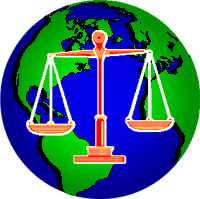5 Worlds / 4 Judgments
|
NOTES - Article is Incomplete
- Regarding the various judgments, see also the general concept: Judgment.
- See also: 5 Worlds / 4 Judgments Temporary Worksheet.
A List of the 5 Worlds and 4 Judgments
Each of these "worlds" represents a distinct ecological system. At the end of each "world" is a radical, worldwide judgment that results in significant ecological changes, preparing the earth for the next ecological "world."
- Other significant events are listed in italics, to show the relationships between them and the various "worlds" and judgments.
- "World 3" has been split into multiple parts, because there are significant differences between them (though ecologically, they are all the same).
- The beginning - All things made by God.
- World 1 - Creation before sin entered the world.
- Judgment 1 - The curse because of sin entering the world.
- World 2 - Creation with the curse, pre-flood.
- Judgment 2 - The Flood.
- World 3 - Post-Flood world.
- World 3a - Pre-Covenant Era - Before the Law.
- The Confusion of Languages - At Babel.
- World 3b - Old Covenant Era - The Law.
- The Judgment of the Cross - Jesus' death and return to life.
- World 3c - New Covenant Era - After Jesus' return to life.
- Judgment 3 - The return of Jesus to the earth.
- World 4 - The kingdom.
- Judgment 4 - The final judgment.
- World 5 - Eternity, heaven and earth together
- The End - All things in submission to God forever [1 Corinthians 15].
Clarification of the Meaning of "World"
The different "worlds" are all related to the same "earth." The ecological impact of each judgment is so significant, that the conditions after it are like living in a different "world."
- 2 Peter 3:6-7 describes the earth before the Flood as "the world that then was," in contrast to the earth as it exists after the Flood.
|
There is also continuity between the worlds, a degree of similarity and familiarity. Those entering a "new world" are able to adjust and carry on life under the new set of circumstances. They can even use the names of the various "old world" features, to describe similar features they discover in the "new world."
- The names of the Tigris and Euphrates Rivers came from two of the rivers that existed in the "old world" - Genesis 2:14.
|
In addition to the "earth-changing" judgments that cause the transition from one "world" to another, there are some other judgments that created significant changes in "non-ecological" ways. This would include The Confusion of Languages, as well as the most significant judgment of all, The Judgment of the Cross.
Trying to Understand Future Events
Observing the Past
Before Jesus came to earth the first time, prophecies seemed to have two emphases: 1) he would come as a suffering servant; and 2) he would come as a glorious king. The prophets didn't know how to "reconcile" these two emphases; and in time, most Jews just picked what they wanted to believe (the prophecies about a glorious king), and misinterpreted them. As it turned out, both sets of prophecies proved true - as the people should have expected them to!
Attempting to Understand the Future
As far as future prophecies about Jesus' return and the eternal kingdom, there also seem to be multiple emphases. For instance, some passages describe the future in terms of perfection, but others mention death (though perhaps less frequent than in our present situation). There also seems to be different judgments - at least different prophecies have different emphases that don't always fit together. Finally, there is a passage in Revelation that mentions a 1000-year period between Jesus' return and the final judgment.
Based on these various strands of evidence, it seems that there are two "worlds" yet to come, as well as a judgment just prior to each of them. This "5 World / 4 Judgment" analysis attempts to bring together these various strands of prophecy, without doing injustice to any of them.
Words of Caution
When examining the issue of future events, we should remember some words of caution: Since these events are future, there may be some details that will be better understood then, rather then now. Also, some information is not told us - an example being the message of the "seven thunders" - Revelation 10:4.
|
We need not think that we have the "final, most perfect" interpretation of things; and should be gracious to those who disagree. God's accomplishment of what he has promised does not depend on the correctness of our understanding of the prophecies!
One last comment: The purpose of prophesy isn't so that we can develop "timetables" and argue over what will happen when. Rather, it is to encourage us to live the right way now and to trust God for the future, come what may.
